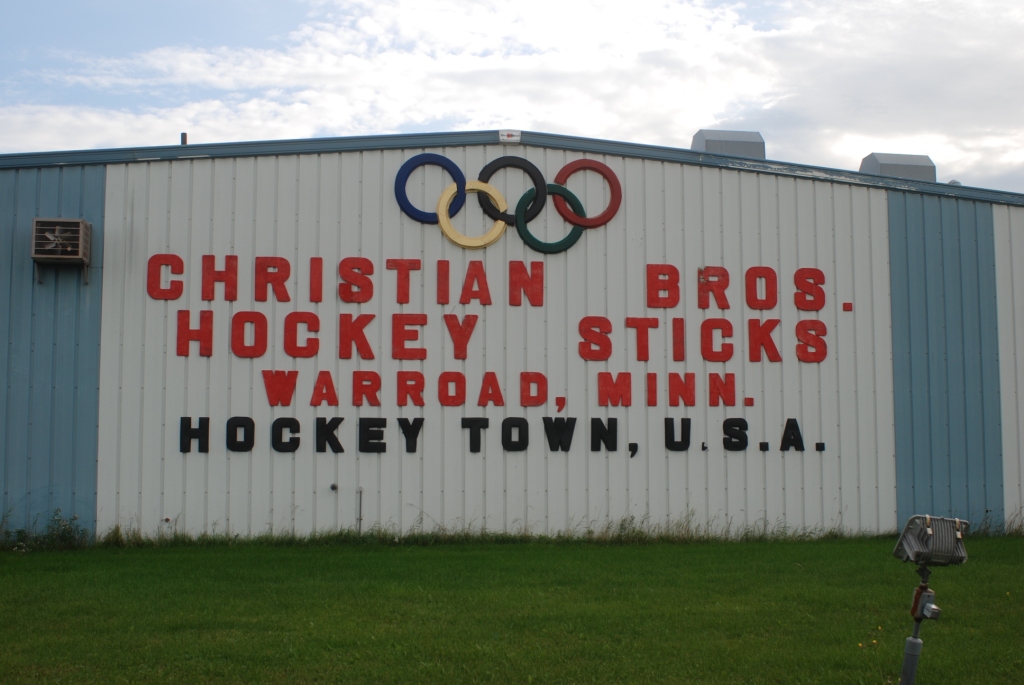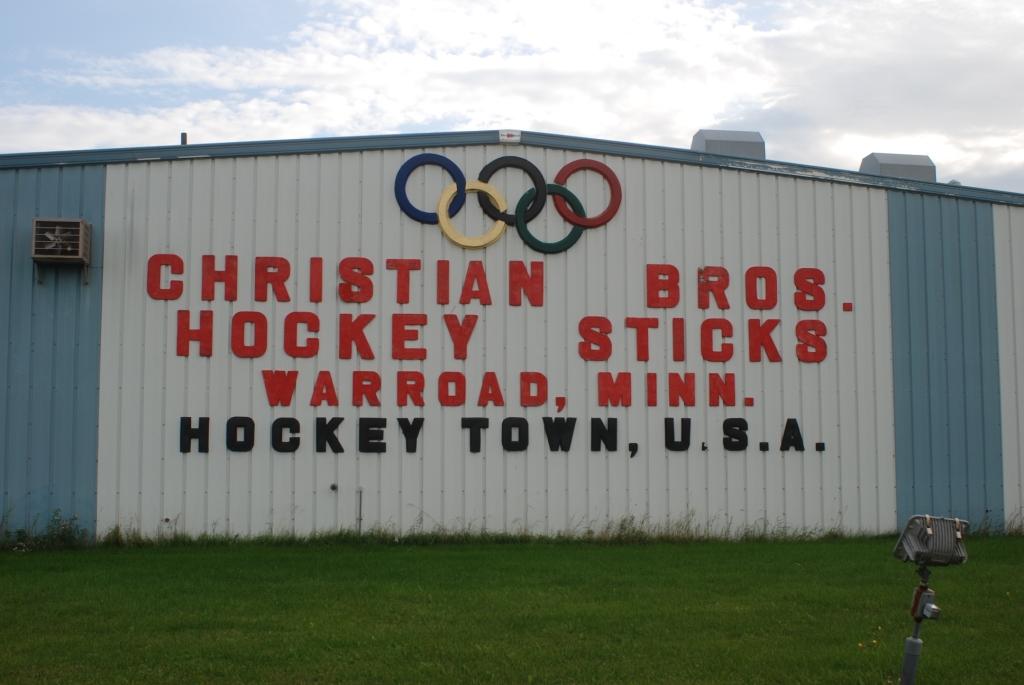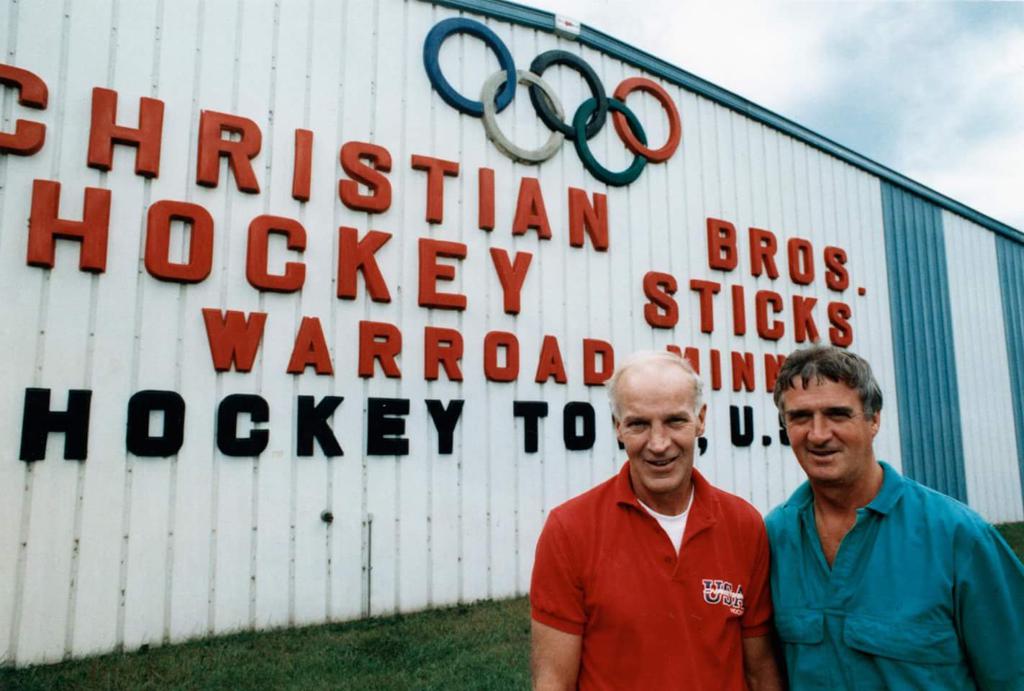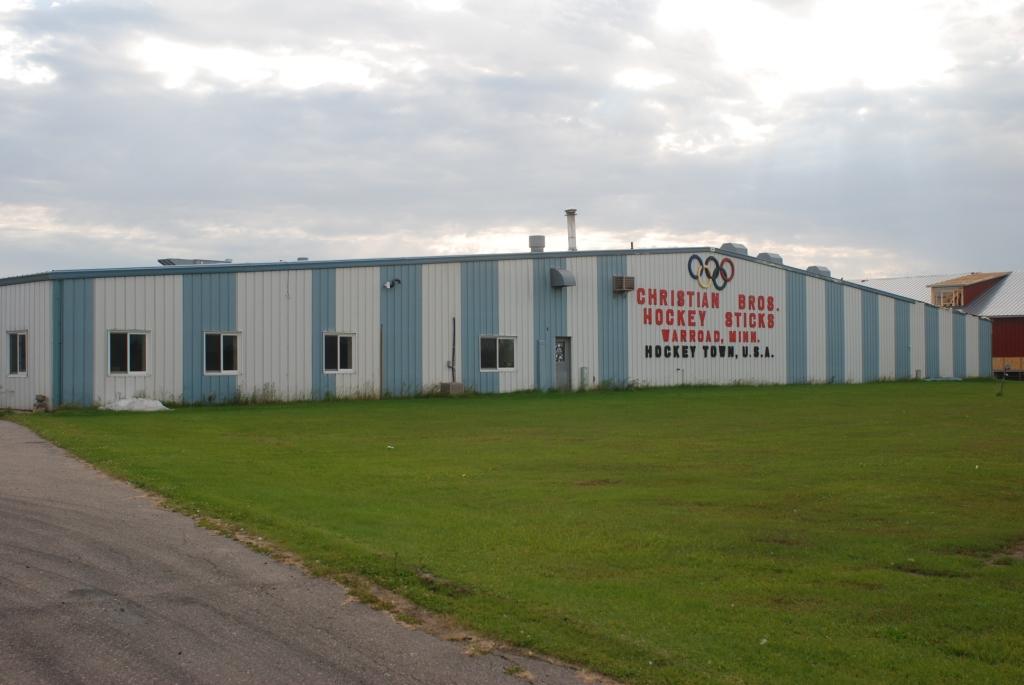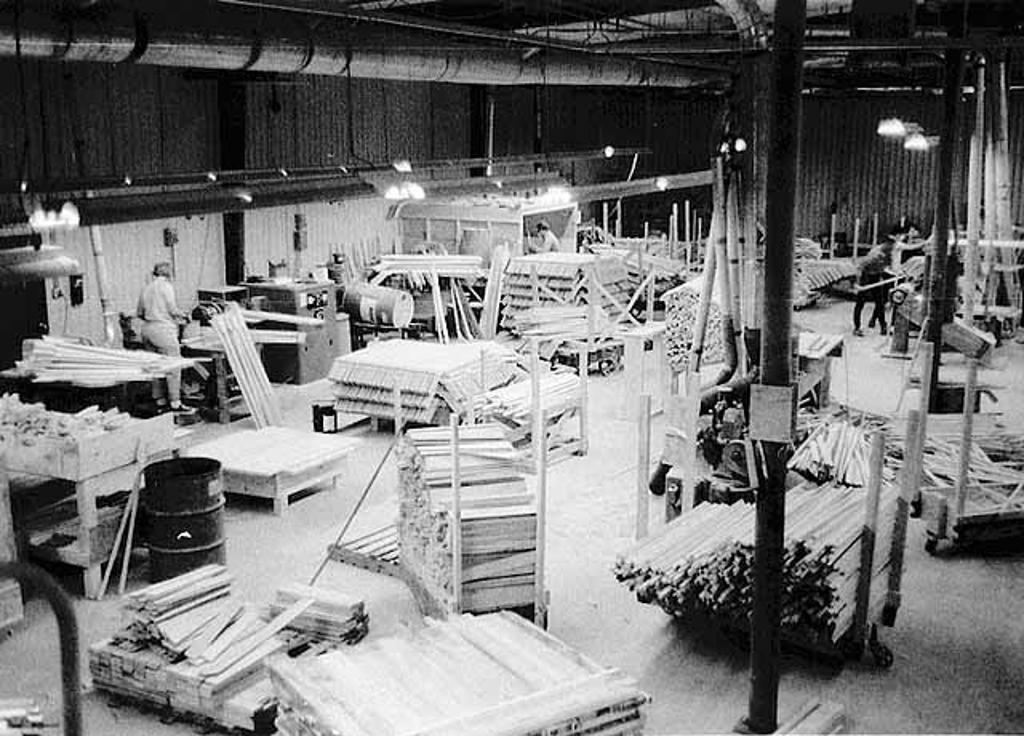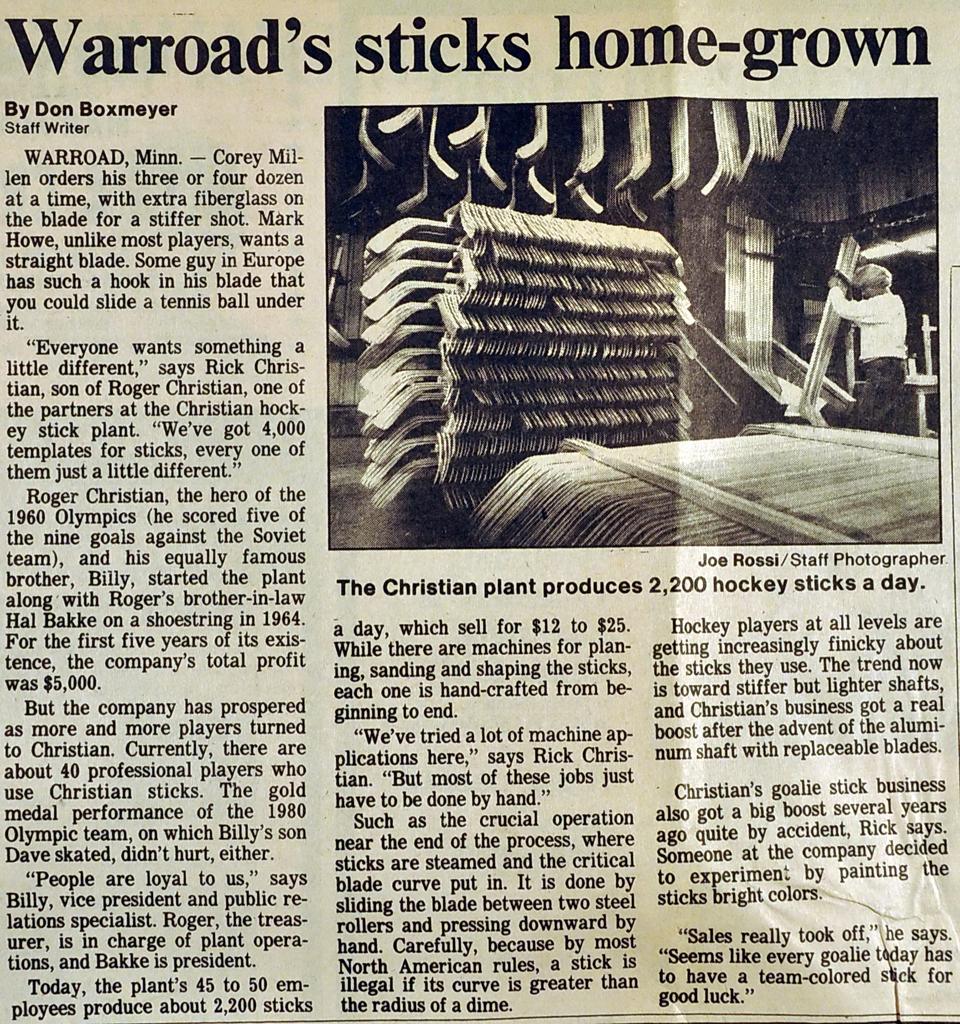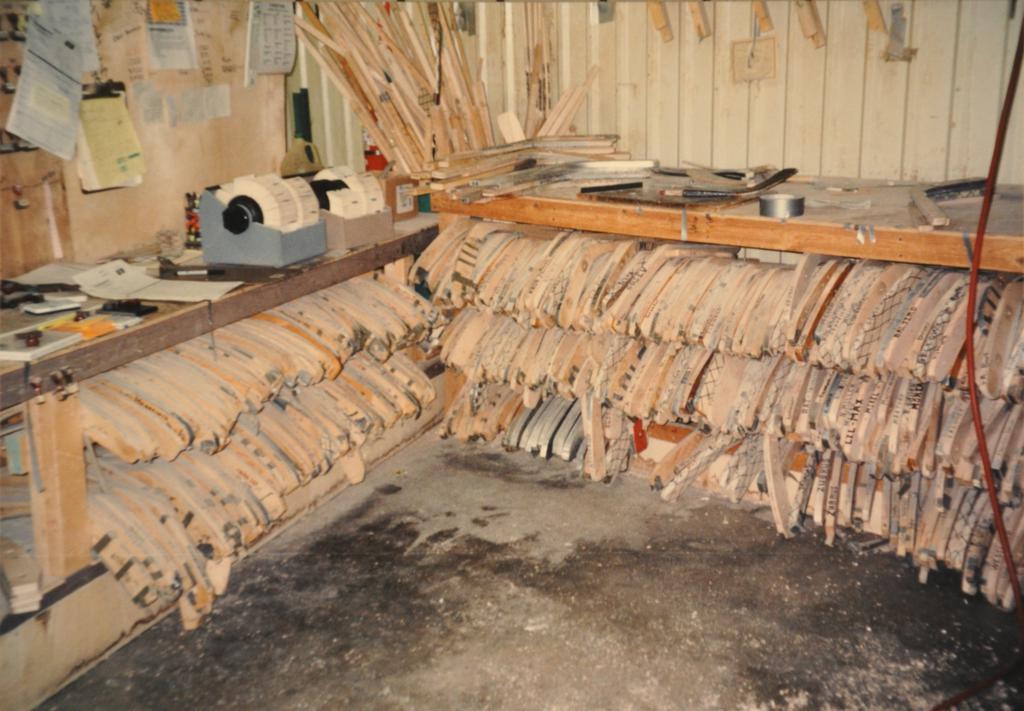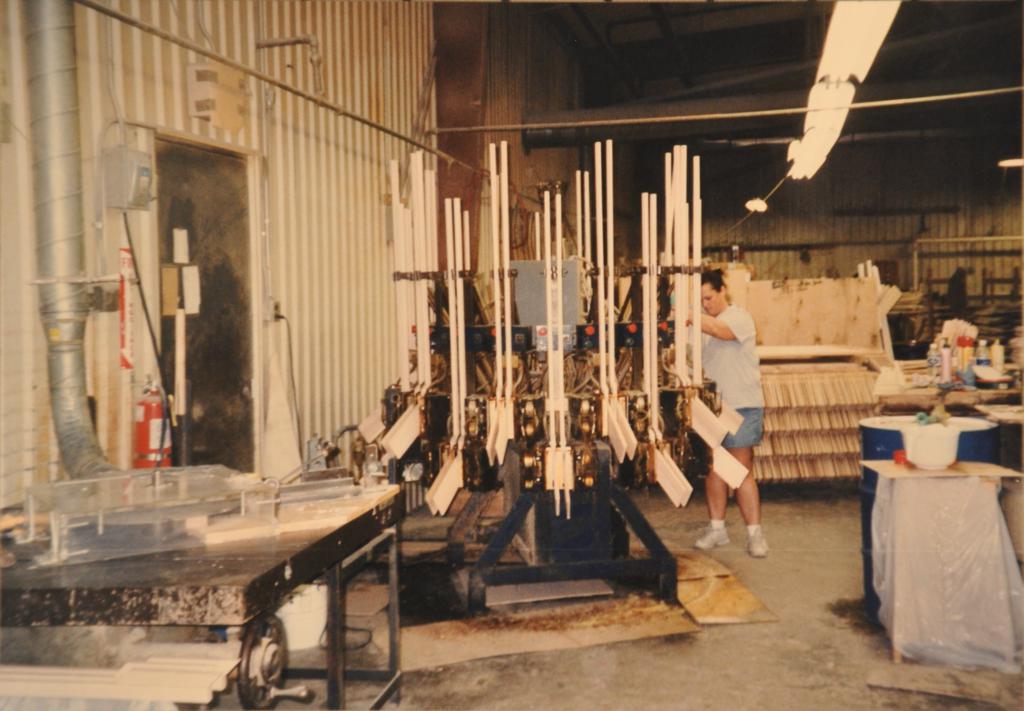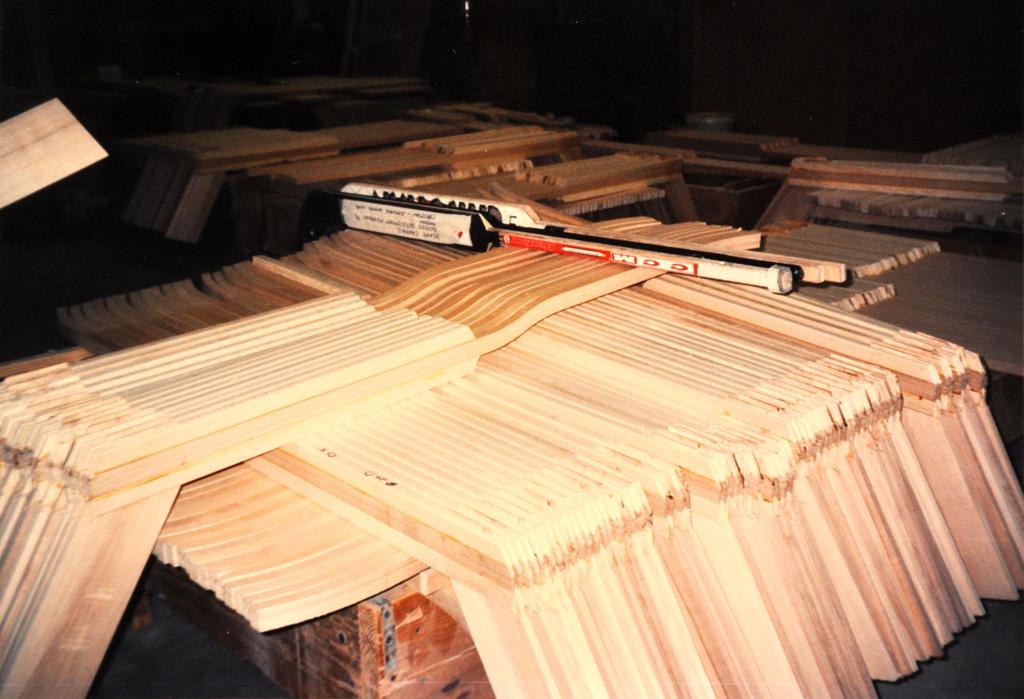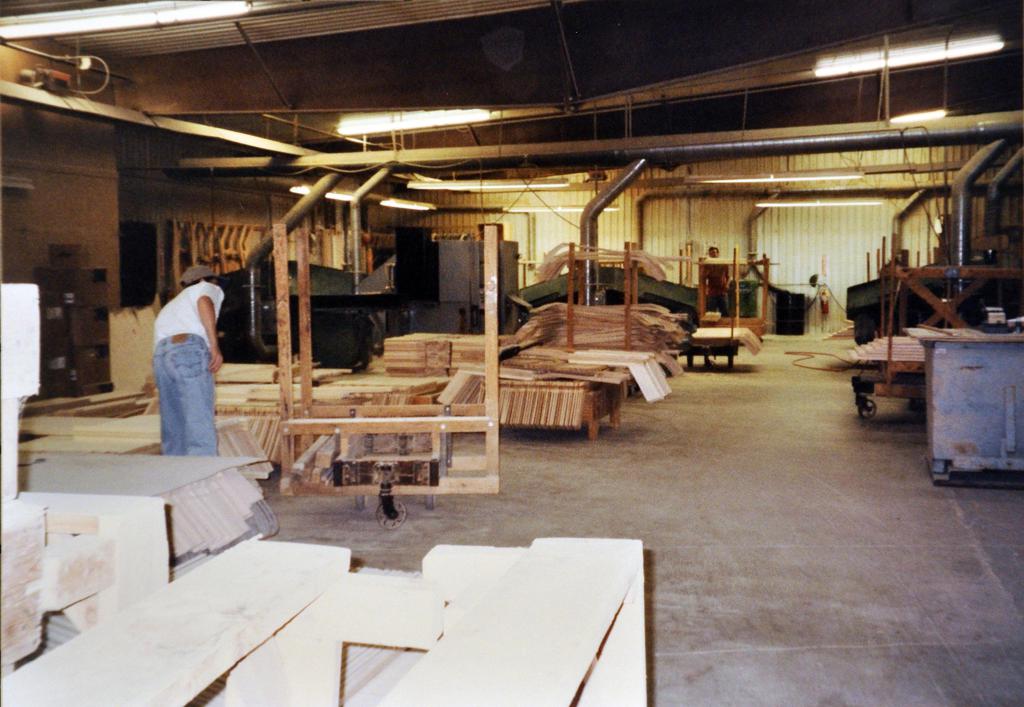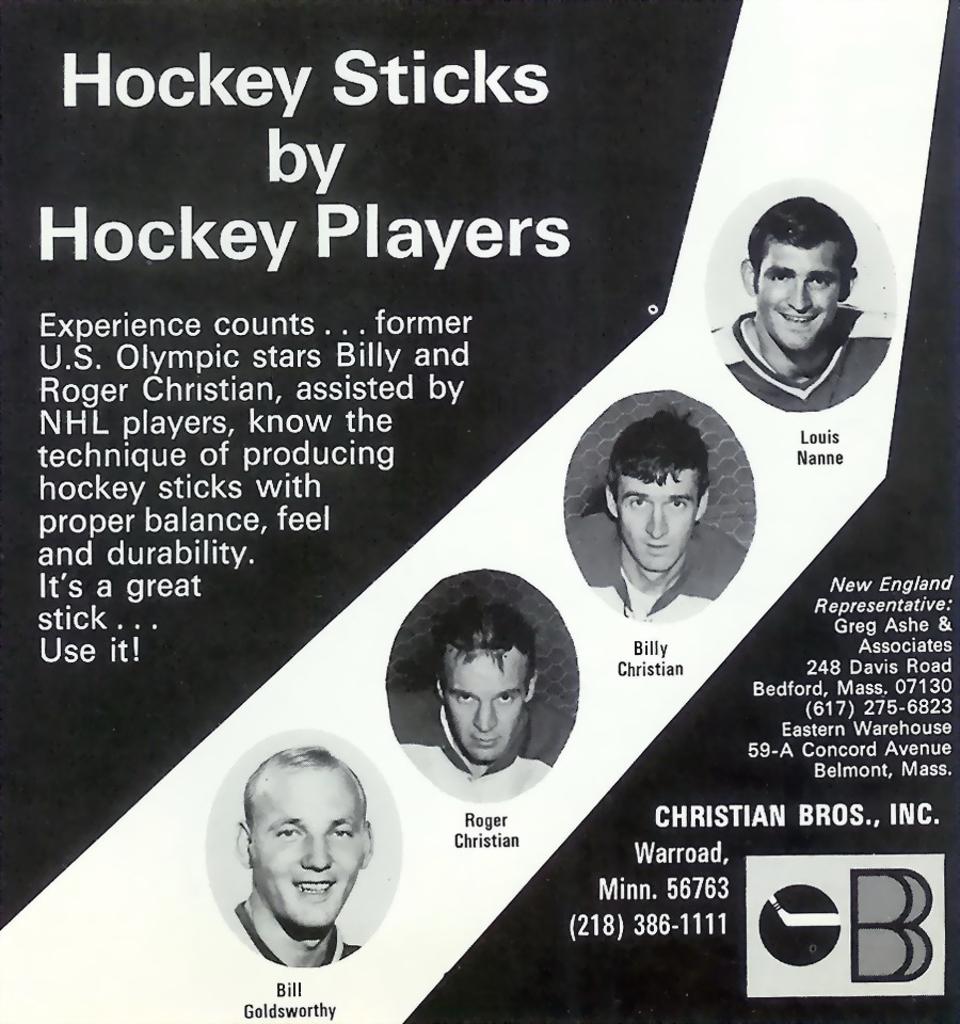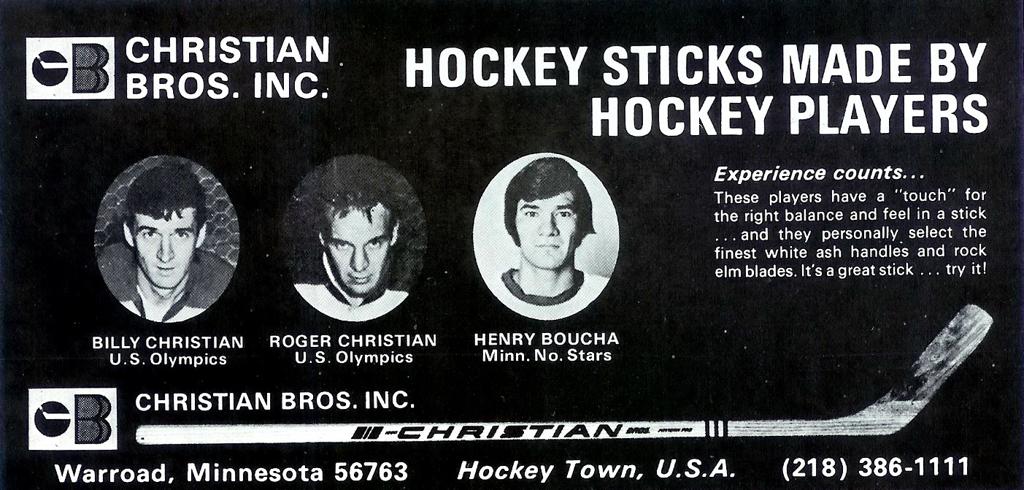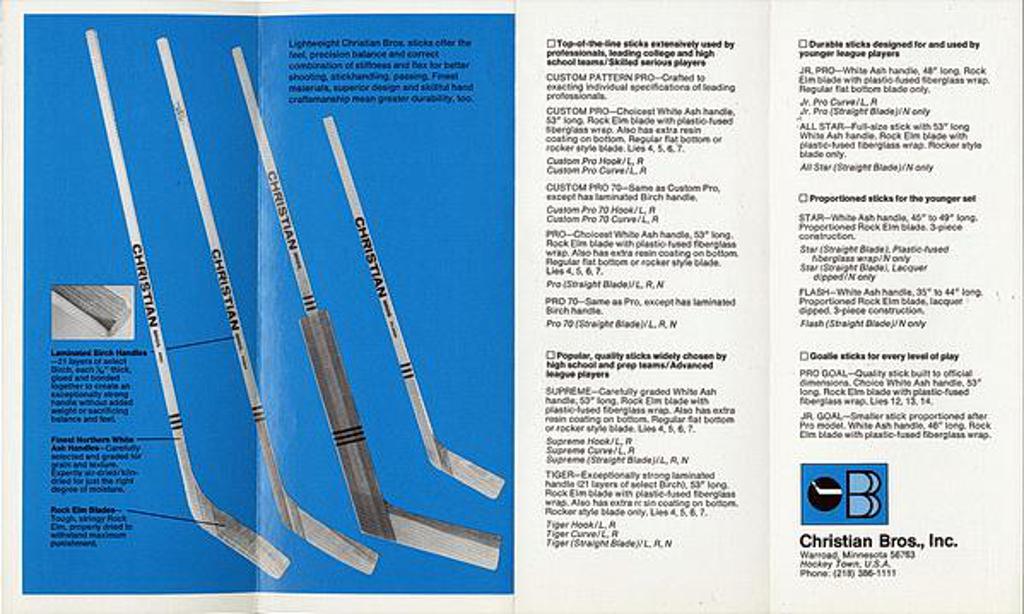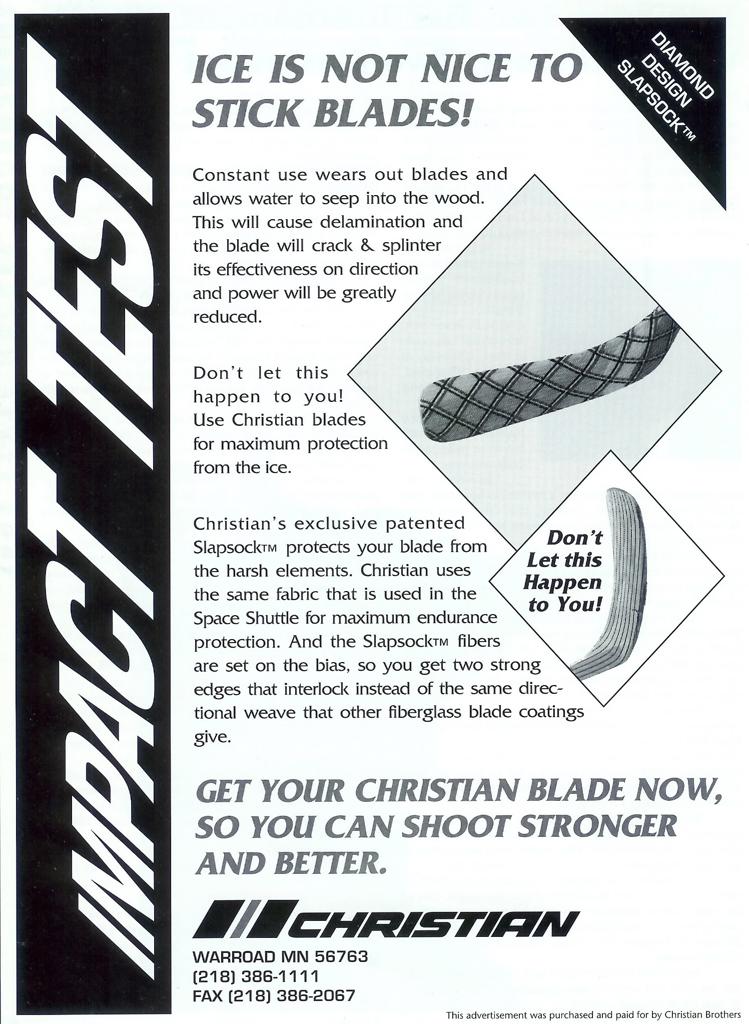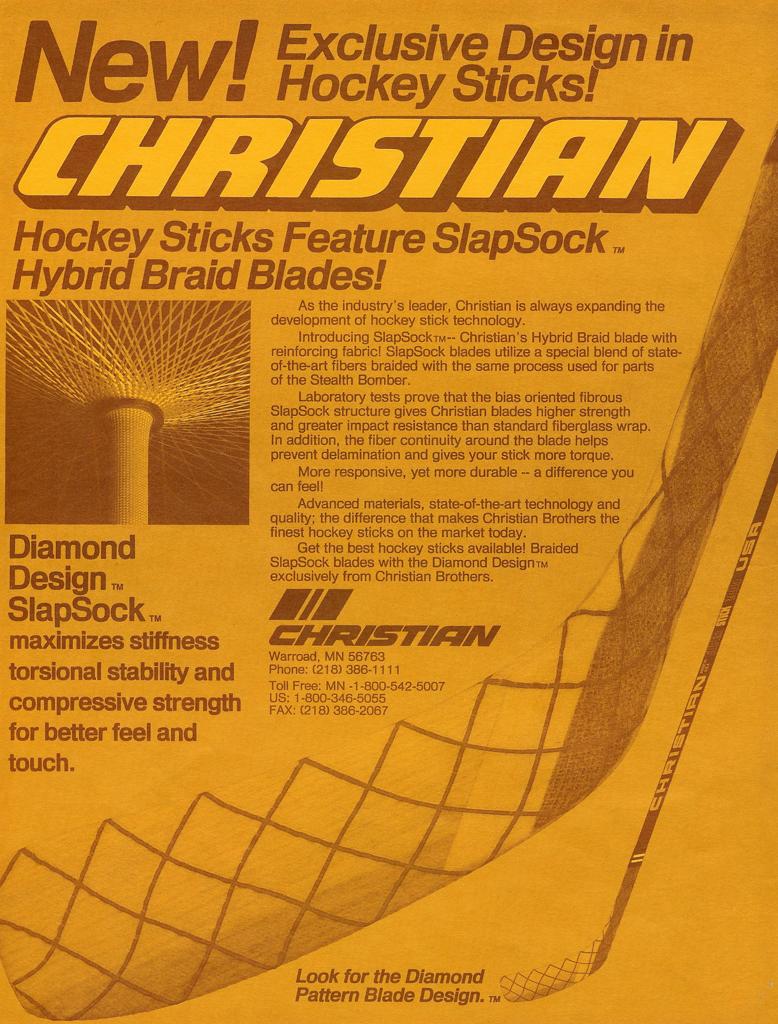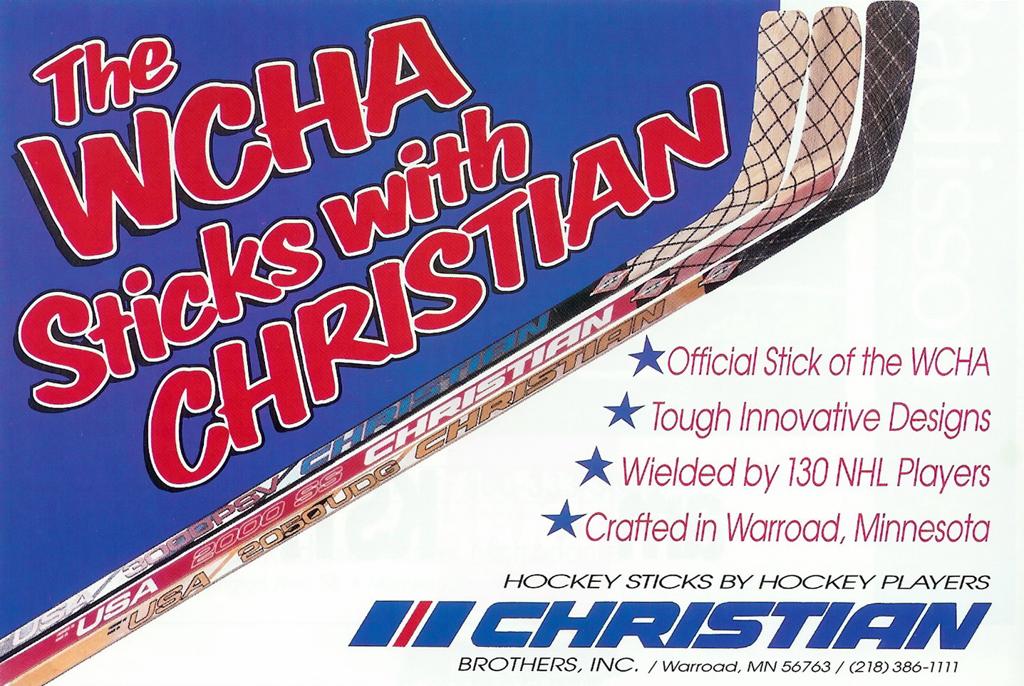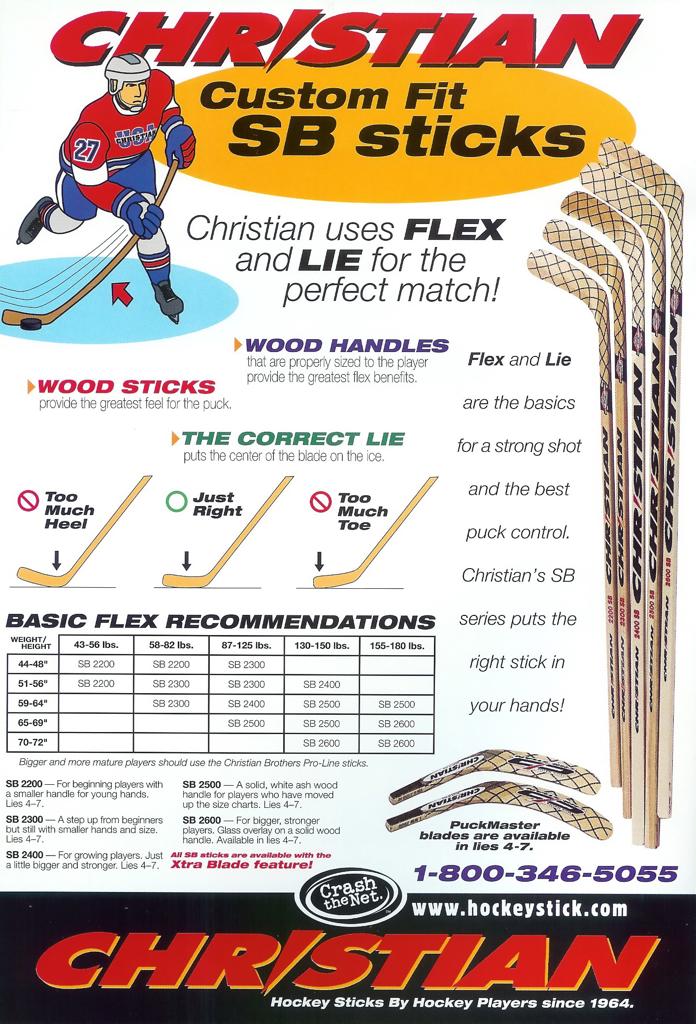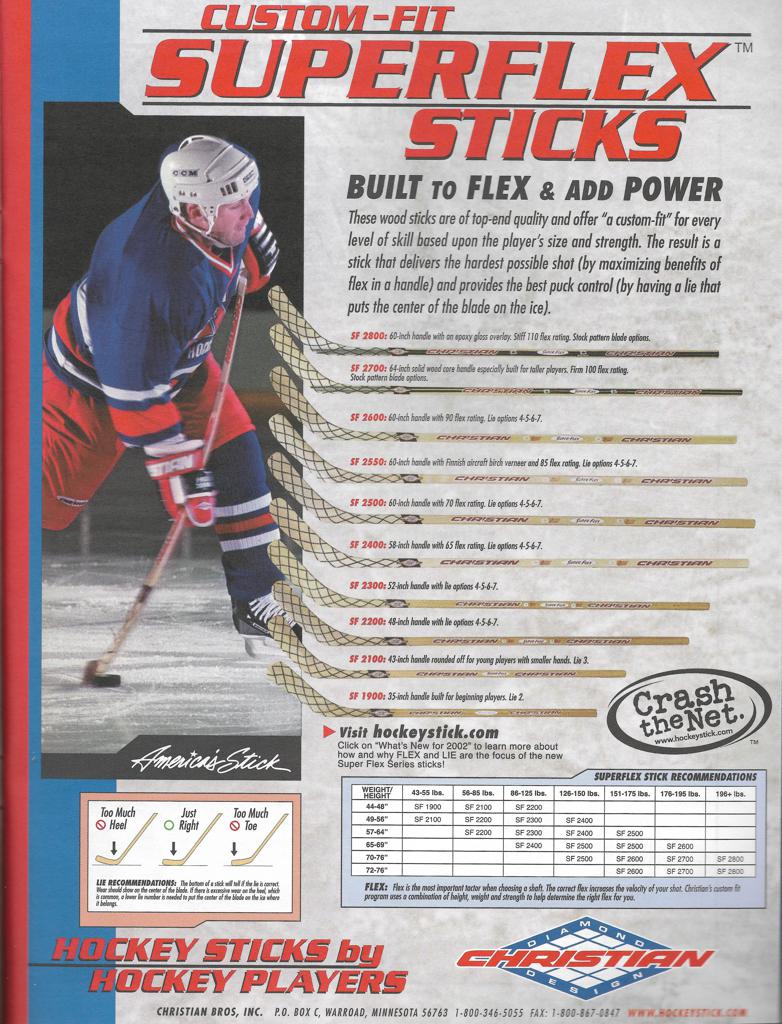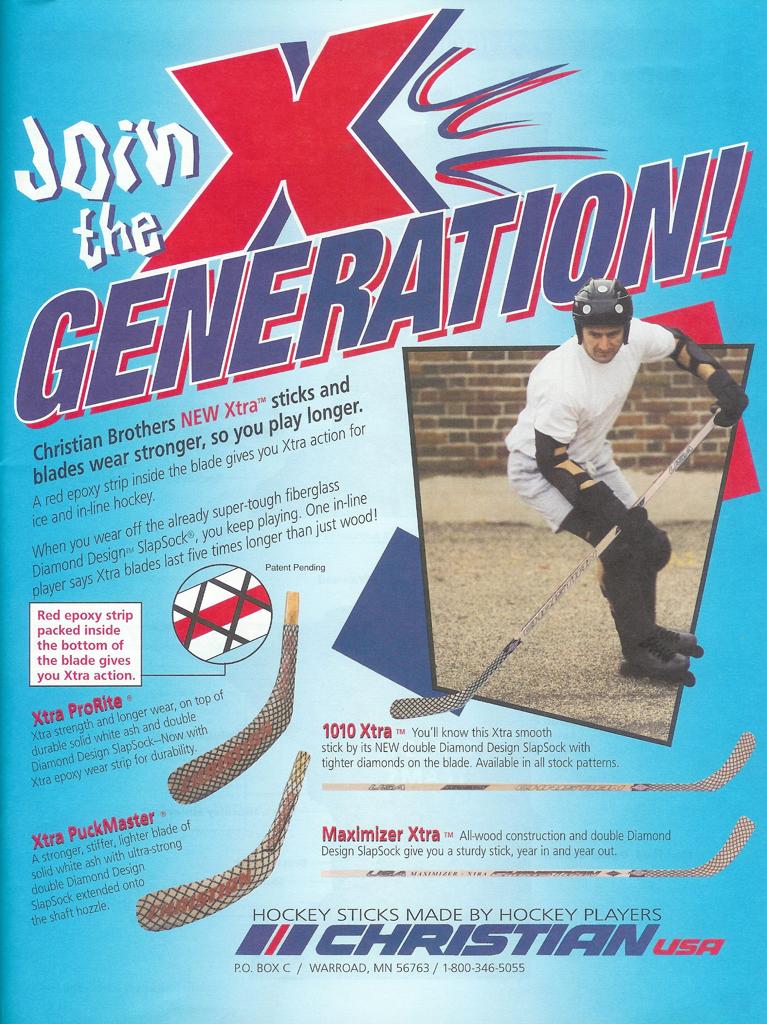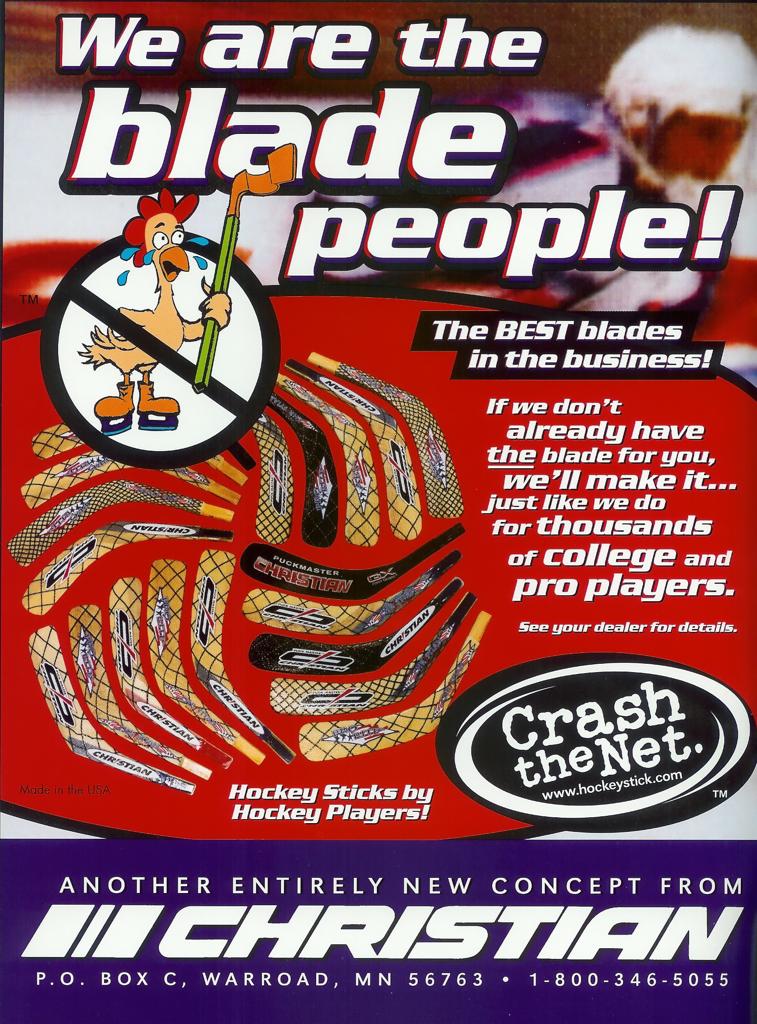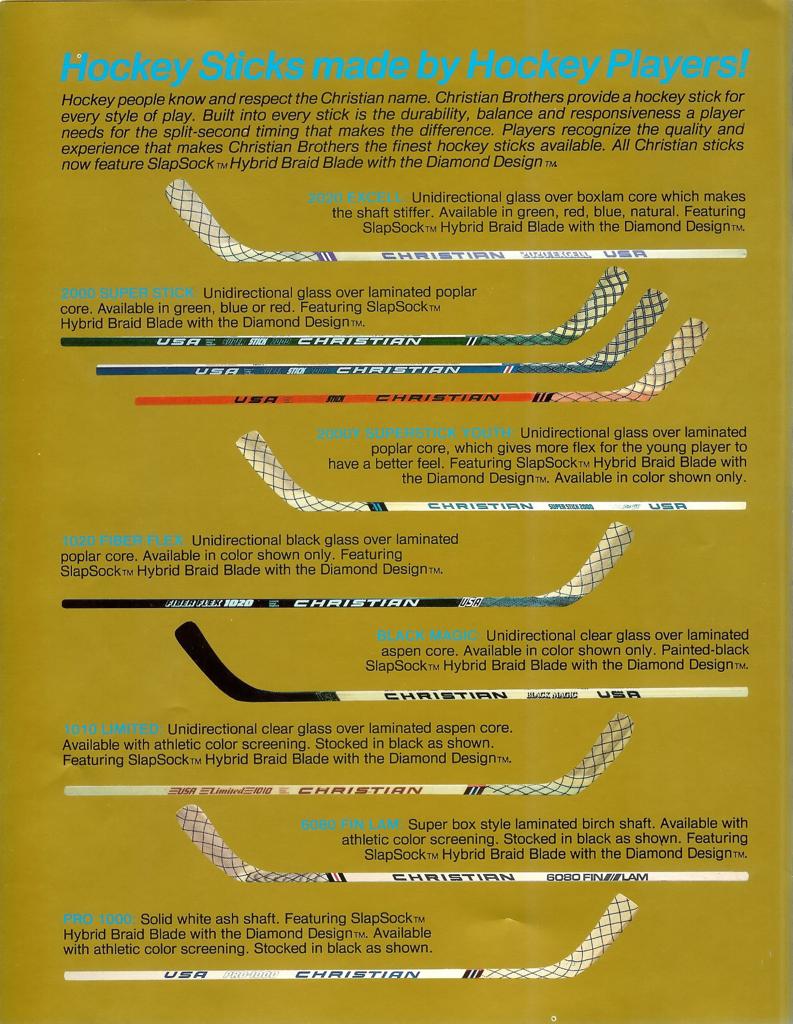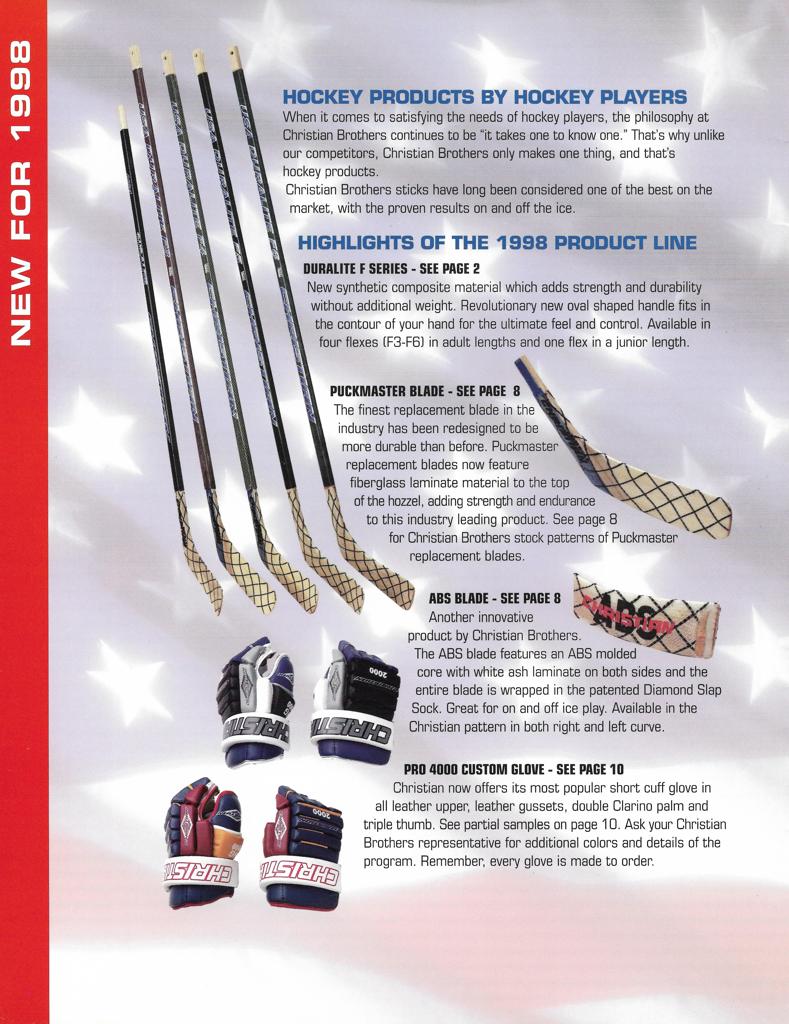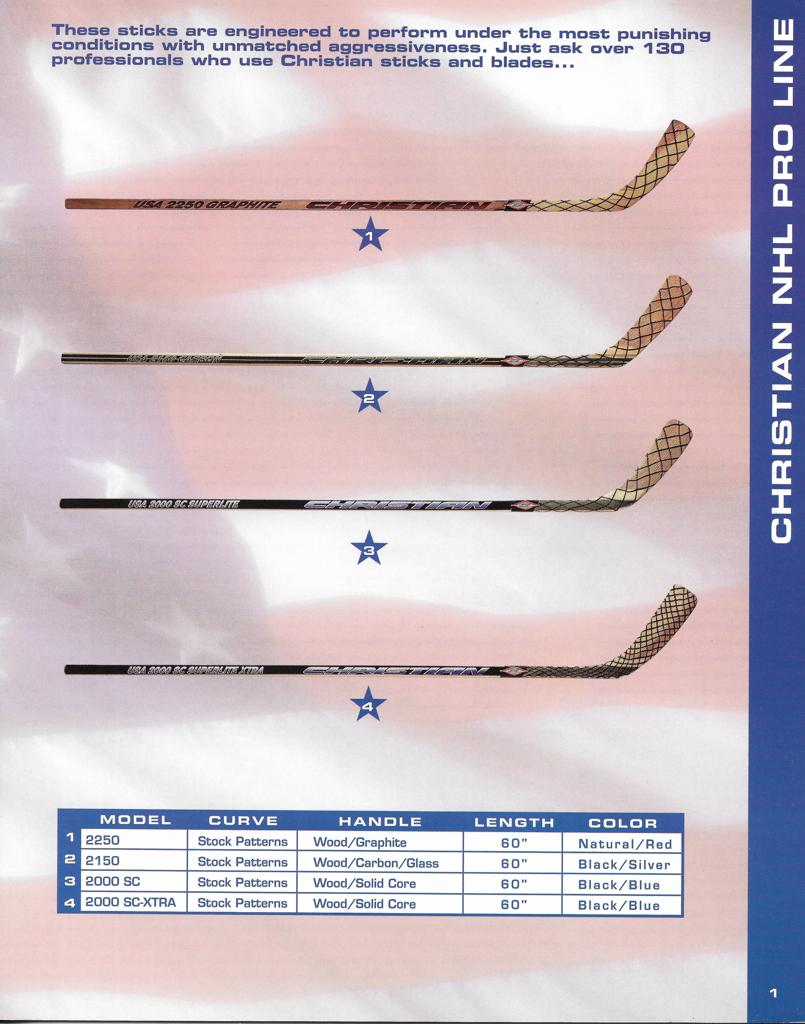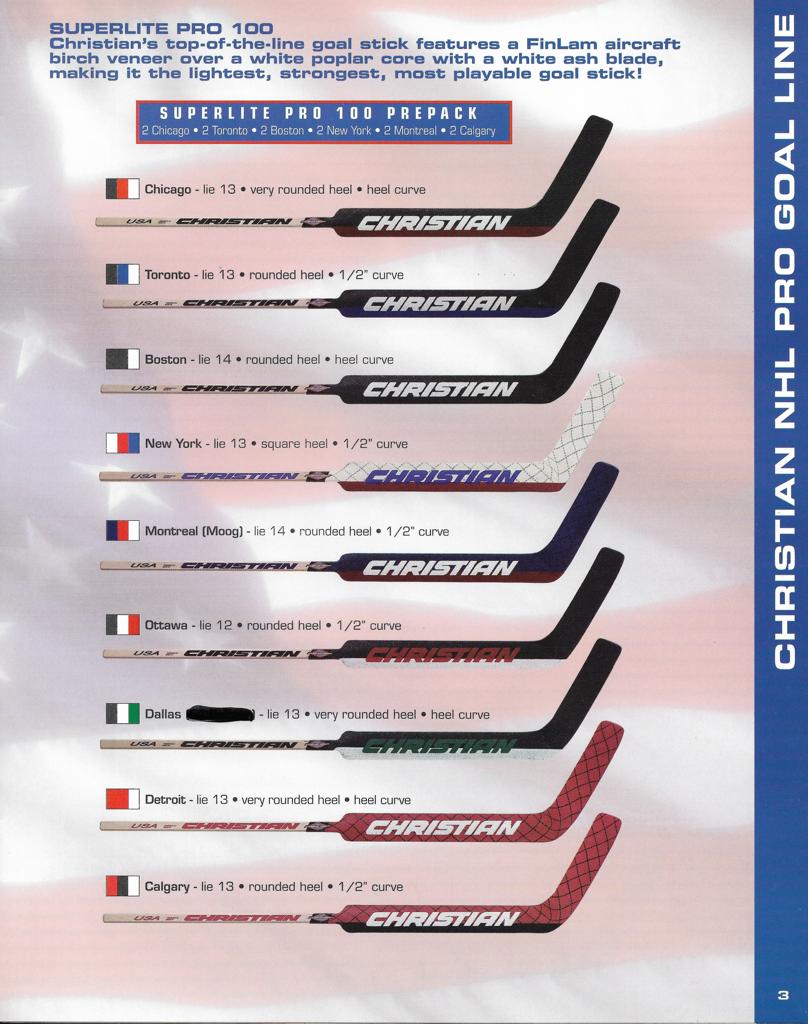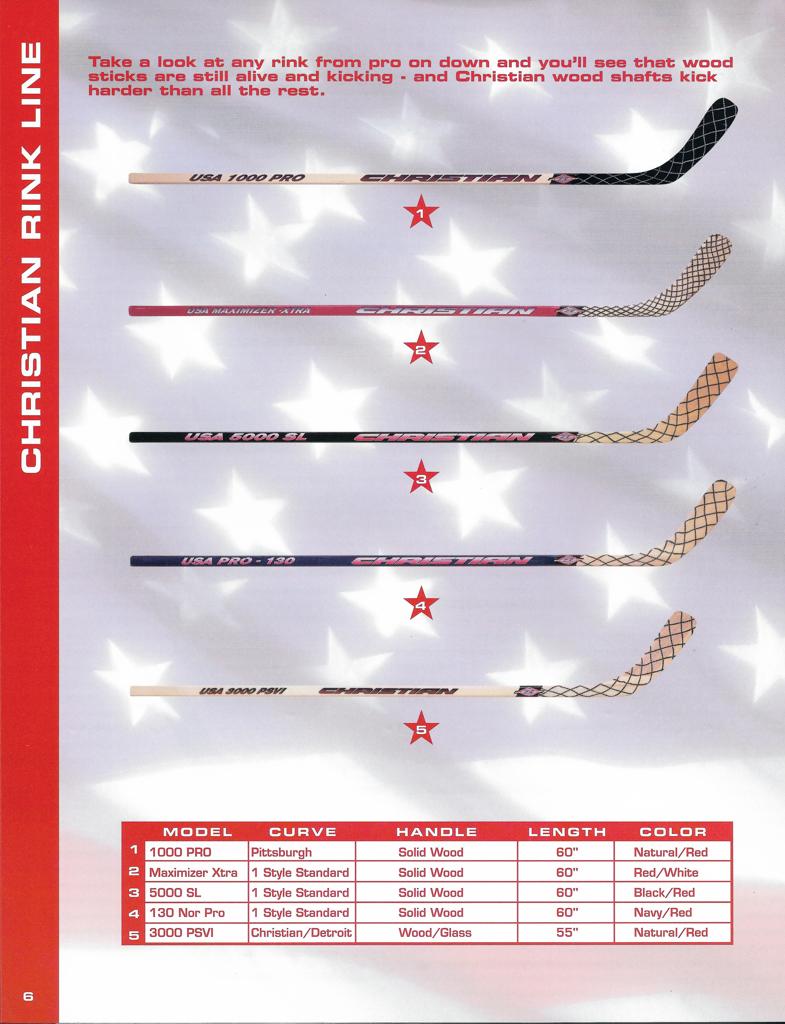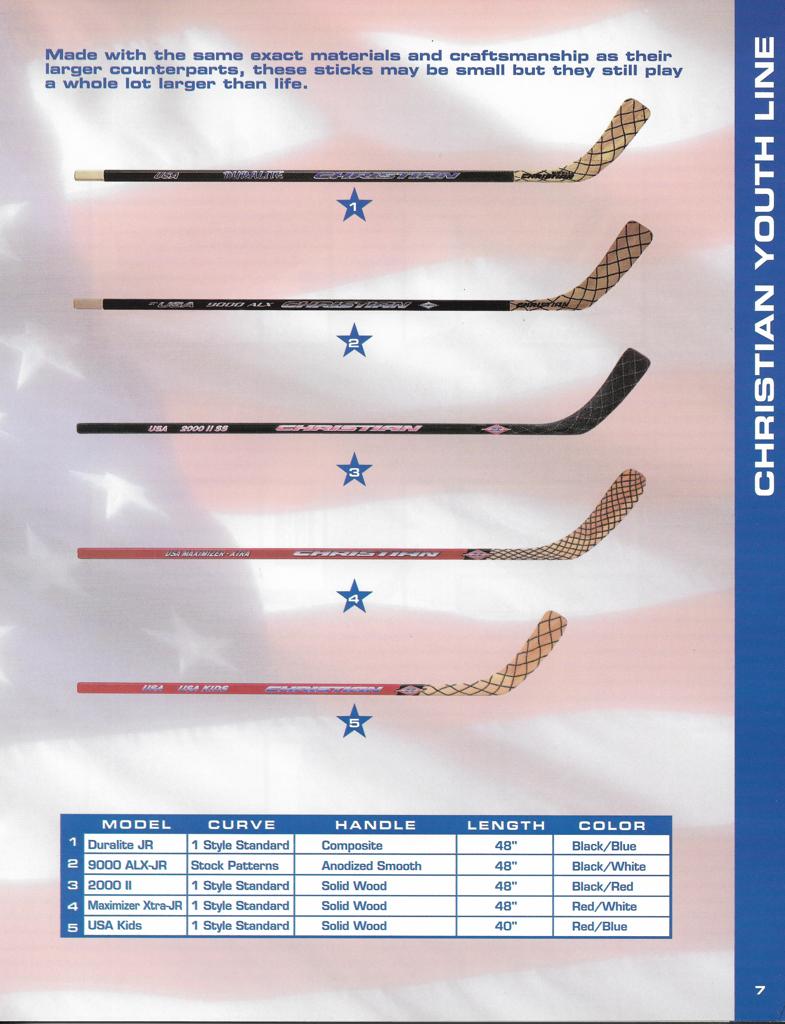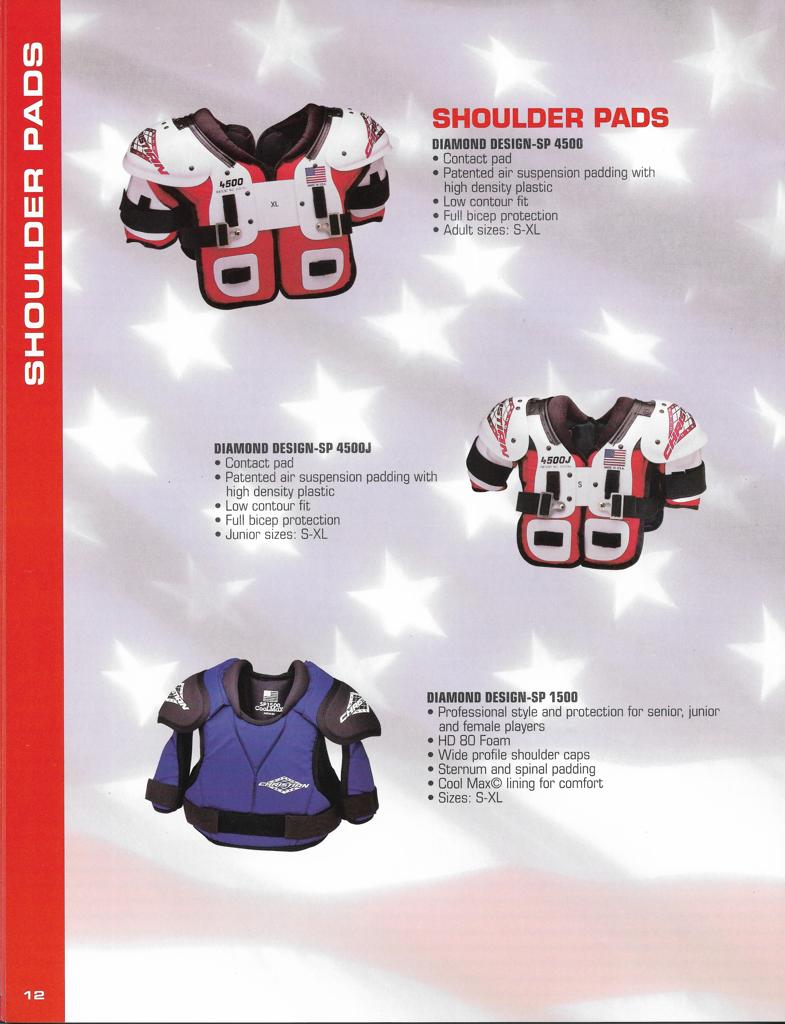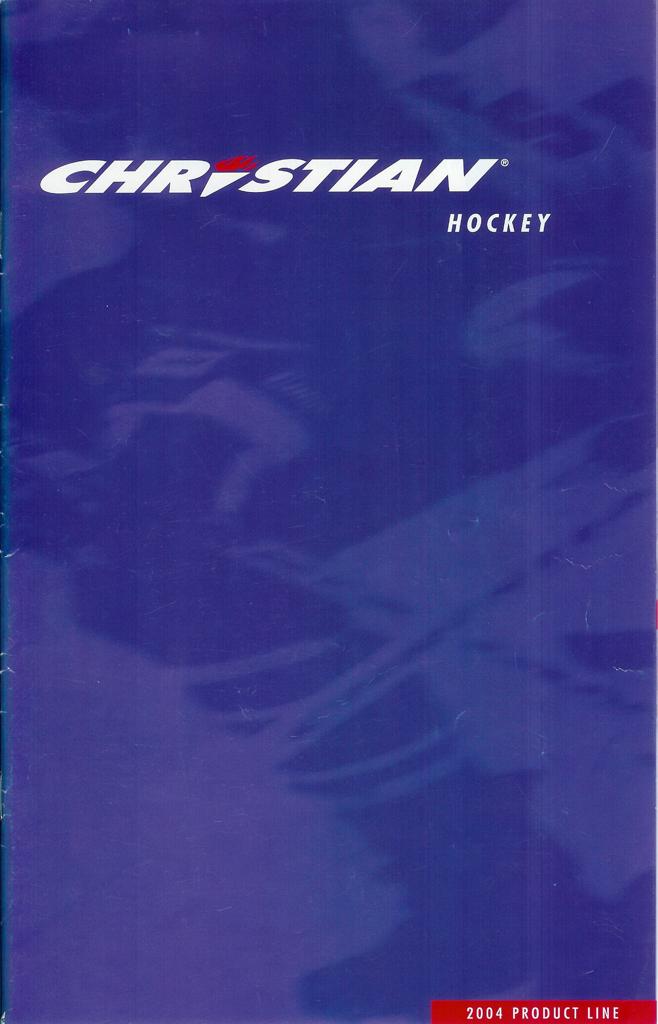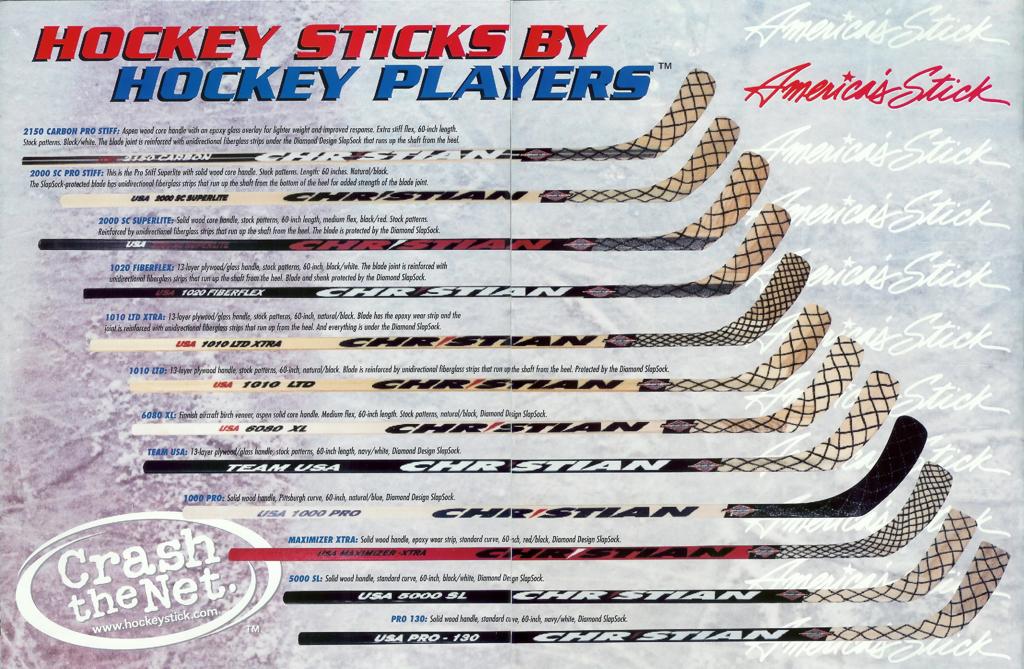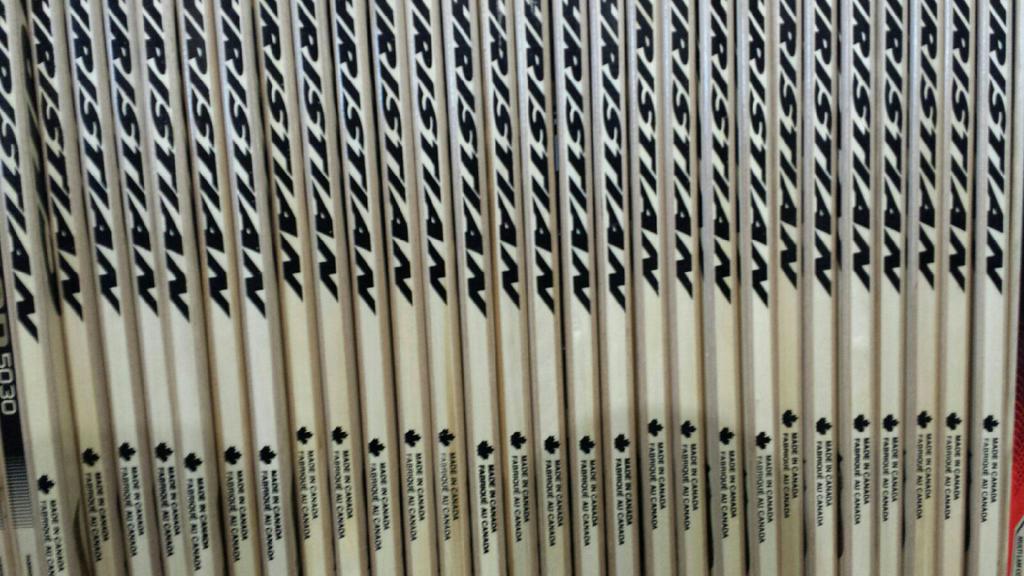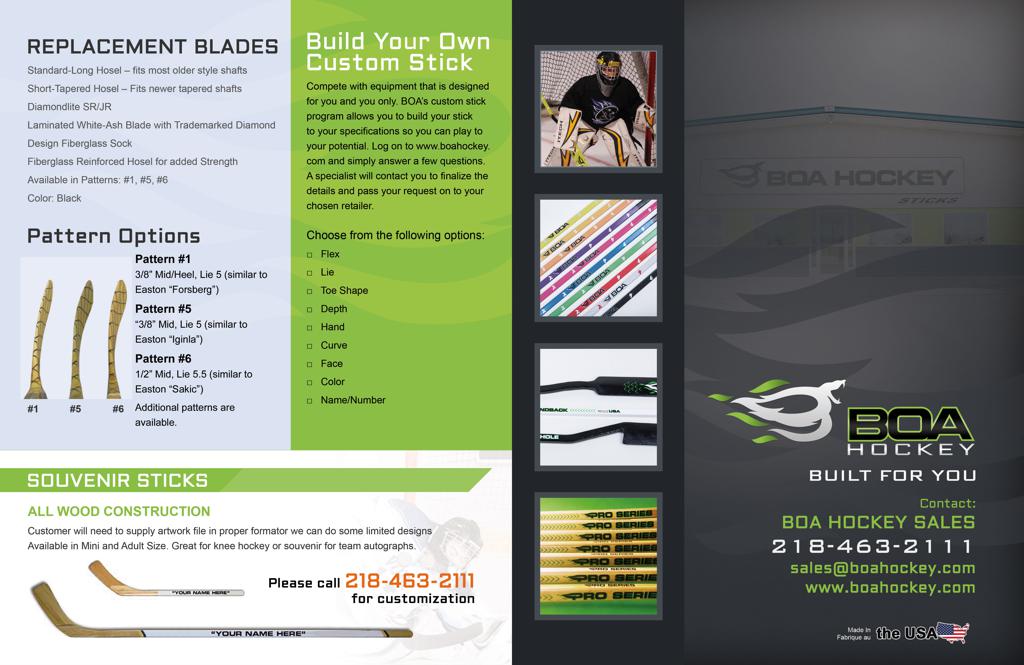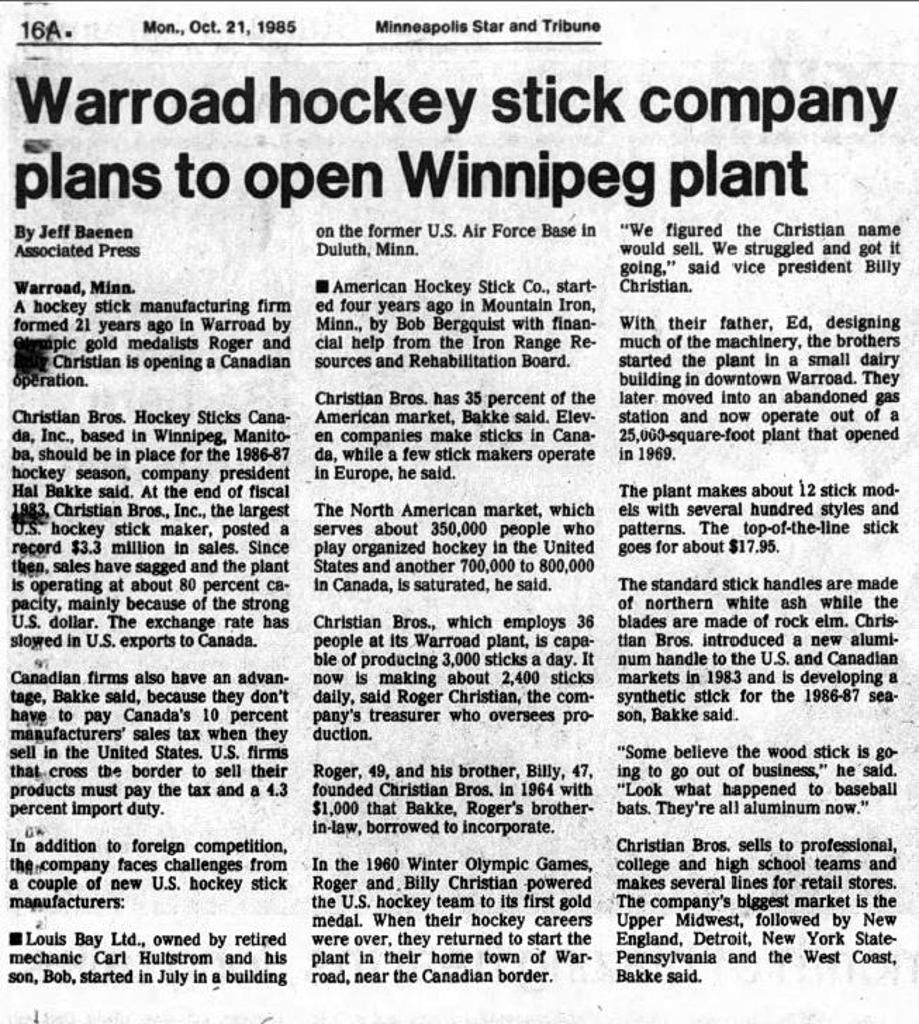Christian Hockey Sticks
"Dad used to fix-up our broken old hockey sticks," Roger Christian recalls of growing up in Warroad, where his father, Edward Christian, was a carpenter. "It sure wasn't like it is now," Bill Christian adds, "when kids have everything and they're starting to skate at two and three years old. We didn't start skating until we were seven or eight." Billy and Roger Christian, whom are the brothers in Christian Brothers, Inc.® , had skated on the frozen Warroad River since they could walk, and tore up the ice arenas throughout northern Minnesota, were called upon to serve their country at the 1960 Winter Olympic Games. Trailing the Soviet Union by a goal in the second period of their Olympic semi-final game with USSR, Billy scored to tie the match, then took a pass from his brother, and Duluth hockey legend Tommy Williams, to net the game-winner. A short time later, they returned to Warroad with gold medals and started making hockey sticks for a living. The idea was thought up to start a hockey stick manufacturing company by Roger's brother-in-law; Hal Bakke, to produce a line of custom American made sticks: Hockey sticks by hockey players. In early 1964 plans were underway for the new Christian Brothers hockey stick plant in Warroad within the newly refurbished old Milner building on Highway 11 west in Warroad. The Christian Brothers name throughout the hockey world was very well known following the dramatic win at Squaw Valley, California and the hockey sticks were taken by storm. To win Olympic gold medals...to become a top hockey stick company in not only North America but in the world were some lofty accomplishments, still the Christian brothers didn't act the part. "Actually, not much really changed," Bill said. "We live only a half mile from where we grew up. All we did was move across the river. The old home is still there. "That's the same river where they were introduced to hockey in the 1940s and 50s. "If you wanted to play," Roger said, "you had to shovel off a place first. Most of the time, we'd go under the bridge because the ice was cleaner there. But we'd play anywhere we could, and it was for everybody... boys, girls, anyone who wanted to play. We didn't have the luxury of an indoor arena or nice, new skates or sticks.
Christian Brothers, Inc. success was so that they expanded from its first location on Highway 11 to a newly built stick producing plant erected in Warroad in 1969 where Christian Bros. continued to operate at for many years. More than one generation of Minnesota skaters grew up knowing the only way to play the game was with a piece of lumber labeled “CHRISTIAN BROS.” on the shaft, and they were the stick to own in Minnesota for over four decades. The family reputation, and the popularity of their sticks, was further enhanced in 1980, when Billy’s son Dave Christian led Team USA in assists at the Lake Placid Winter Games, helping cap another re-markable comeback and bringing another gold medal back home to Warroad. In the wake of the triumph, sales climbed around 40%--from about 350,000 sticks a year to 500,000 in the mid-1980s--thanks largely to the free publicity generated by the team's best players' use of Christian Bros. sticks. But times change, and the 1990's brought trouble to the family business. A combination of increased competition from sporting good giants and a shift away from wood sticks to more use of composite materials caused struggles for the Christians and their small town operation. The firm made its sticks in the summer and didn't sell them until the winter, which tied up its capital for six months a year. And then there was the matter of the strong dollar. "You just couldn't export," Bill Christian says, "and we had good Canadian and European markets--about half our sales. For our first two decades or so, when the Canadian dollar was just 5% or 10% lower than ours, you could live with it. But when it got down to 55 cents at the end, it just killed us." This left the company in a bit of a catch-22: To get around the exchange rate, it needed to build a plant in Canada or Mexico, but it never had the capital because of the poor exchange rate. Christian Brothers also never had the money to pay endorsers, relying instead on the good will of the former Olympians to promote their sticks. As the players' fame faded, so did the company's profile. Christian Brothers' succession plan fell through, too, when Bill's son retired to start a career in coaching after playing pro hockey for 16 years. In August of 2002 Roger and Bill were forced to sell the business because they could no longer compete with the larger Canadian hockey companies due entirely to the inflated U.S. dollar. Some companies would face those challenges by borrowing or seeking outside investors. But the Christians didn't, which may point to the root cause of their company's demise: a lack of energy. "You get older, and you lose your enthusiasm to do it," said Roger Christian, 67. "We didn't keep up with the times, and we got tired in the middle of it." Platinum Group of Eden Prairie purchased the company and all naming rights from Roger and Bill Christian- thus the old motto of "Hockey sticks by hockey players" formerly ended.
After owning Christian Brothers company for a mere 10 months, the "newly" formed Christian Brothers business had also hit "rock bottom", when Platinum Group went bankrupt in June of 2003. The Christian plant was forced to shut down and thus was the end of the line for Christian hockey sticks. However, after a brief hiatus, there was another Christian comeback. The rally began in September of 2003 to resurrect the Christian Brothers hockey manufacturing name when Denver-based Harrow Sports inquired about buying the operation from Platinum Group, and owning one of the most renowned names in American hockey equipment. A mere six months later (November of 2003) after Platinum Group filed for Chapter 11 bankruptcy, the plant in Warroad was re-opened for business. Once a dominant brand, Christian hockey sticks and other sports equipment were on their way back with renewed sense of purpose. The folks at Harrow fully understood the importance of the Christian brand and the family name to the hockey community in Minnesota and neighboring states and were eager to add a line of wood hockey sticks to go along with the graphite sticks already being produced in Colorado. “Historically, more than 70 percent of Christian’s business has been done in the Midwest, so we clearly know what an important market we have in our own backyard." "The brand had been slowly disappearing for a few years to the point where people in other parts of the nation didn’t see Christian Brothers like the people of Minnesota do, and that’s something we aim to change.” The change began by having Christian get back to the company’s historical strengths. The brand’s new managers didn’t plan on spending a lot of money on endorsements this go-around either, but instead wanted to win back the highest-level players (especially those who still prefer wood sticks which today is only one in 20 NHL players) by providing custom-designed sticks.
After a generation of being the "guy in the middle" of the action on the ice, making others stand up and cheer, Billy Christian is satisfied to watch from a distance and root for the new home team. He and Roger are now at retirement age, and are offering support and encouragement as the stick line they founded and grew with years of hard work is born again. “I’m sure pulling for these guys to make a success of it,” said Billy. “It’s very important for Warroad and the region, not only in terms of jobs but in terms of identity. A lot of people are pretty proud to say that we’ve got our own hockey stick plant here in Warroad.” “These sticks are really part of the hockey history here, so I like to think that Christian sticks are pretty important for the hockey community in this state,” he said. “We’re all certainly very happy to see them open for business again.”
Harrow was started by CEO Mark Hayden who has a golden touch, with his hands in the creation of Blockbuster Video, Boston Market, Caleel & Hayden cosmetics, and Bancroft the racquet manufacturer. Harrow, produces equipment for Hockey, Lacrosse, Squash and Tennis prior to acquiring the Christian and Northland hockey sticks insignia/trademarks both from bankruptcy.
"There are a lot of advantages to wood," said John Bayreuther, Christian Brothers' new senior vice president of marketing and former lacrosse coach at the University of Denver. "It's softer, has a better feel and is cheaper than graphite. It's moldable, so you can customize it." The composite shaft with wooden blade is the best of both worlds because it has a light, durable shaft and a blade with a better feel." Christian Brothers and Harrow face stiff competition because more companies now make hockey sticks. But one appeal, and selling point, of Christian Brothers sticks has little to do with product; it's about their place in hockey history. Jim Craig, the 1980 U.S. Olympic team's goalie, buys the manufacturer's sticks for autographing, as do former NHL greats Bobby Hull and Gordie Howe. Christian's ability to compete against the major hockey brands will come down to customization and service. "We can and will make any type of hockey stick, replacement blade and goal stick in any color, pattern, curve and graphics," To add to this story, the manufacturer also made replicas of the sticks used by the 1980 U.S. Olympians for the Disney movie "Miracle." The movie, starring Kurt Russell as coach Herb Brooks, recounts the rigors that team underwent to beat the Russians. After all, the actual "Miracle on Ice" USA hockey team wielded plenty of American timber from Christian Brothers back in 1980, led by Bill Christian's own son, Dave.
"Because of the cost and breakage of one-piece graphite, we think wooden blades and sticks will rebound. Due to all the wood hockey factories closing in the last three years, we see the lack of wood supply to be in our favor." (CEO Mark Hayden comment in November of 2003) One thing is for certain, wooden hockey sticks are vanishing from the game. Sher-Wood, located in Sherbrooke, began outsourcing its wooden hockey sticks in January of 2007. Bauer shut its hockey stick factory in Hespeler, Ont. in 2004. Employees there formed a new company named Heritage Wood Specialties, acquired the factory and assets, and today continue to manufacture wood sticks in Hespeler. Victoriaville, CCM, and Easton, continue to sell wooden hockey sticks but they, too, are made in foreign countries.
On Monday December 8th 2009 the Christian Hockey name along with the trademarks were purchased from Harrow in Denver, "Harrow has sold the Christian hockey name and trademarks and will no longer be making composite shafts with the Christian name and/or selling wood sticks made by Christian in Warroad, MN." "The Warroad hockey plant built by the Christian family in 1969 has officially closed it's doors for good." The stick producing equipment was emptied from the Warroad plant and moved to nearby Roseau, MN. Chad Bakke, Bill Hagen Sr. and Jr., Rick Pomplin, Steve Czech, Dale Smedgmo, and current NHL player Dustin Byfuglien purchased the rights to Christian Hockey together and set up a brand new stick producing facility in Roseau for yet another comeback for Christian Brothers Inc. "The decision to move to nearby Roseau was a hard one since Christian Hockey has been in Warroad since 1964. We tried to get local interest in Warroad to keep the manufacturing plant in Warroad but we had no calls back." "The building we are in now in Roseau was already owned by Dale and Bill and was sitting vacant after the former D&E sporting goods closed" (Said Chad Bakke via phone in a VMH.com interview) Once moved to Roseau they were located at: P.O. Box 56 Roseau MN, 56751. Boa and 11 Hockey was a collaborative effort producing high quality wood hockey sticks in Roseau. They "still have the same old patterns & screens for both Northland and Bending Branches sticks, and CAN produce sticks with this artwork today in Roseau. The Christian Brothers sticks name was owned by Torspo Hockey of Anoka, MN now as "they purchased the rights to the Christian Bros. name after Harrow sold off the company", but was sometime purchased by Sher-Wood hockey sticks of Canada (as wooden sticks bearing the 'Manufactured in Canada' printing are showing up in Total Hockey stores across Minnesota in 2014). The Boa Hockey-11 Hockey sticks plant - previously run by Jeff Cahill appears to have been shut down - adding to the long line of start-ups, and shut-downs of hockey sticks being manufactured in Northern Minnesota.
“For a generation or more, countless Minnesota kids have grown up playing hockey and using sticks produced right here in Northwestern Minnesota”
Source in part: "Winning Under 2 Flags" Author Warren Strandell | Harrowsports.com | "Hockey Sticks From Hockeytown" Jess Myers | Telephone conversations from Harrow corporate offices. | Warroad/Roseau contacts by VMH.com
Husky Productions - Christian Hockey Factory
BOA Hockey Sticks Plant Tour Roseau, MN


